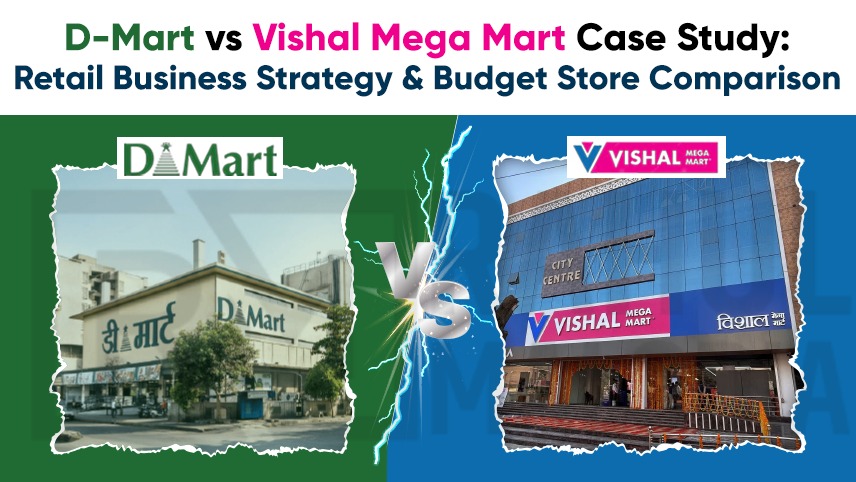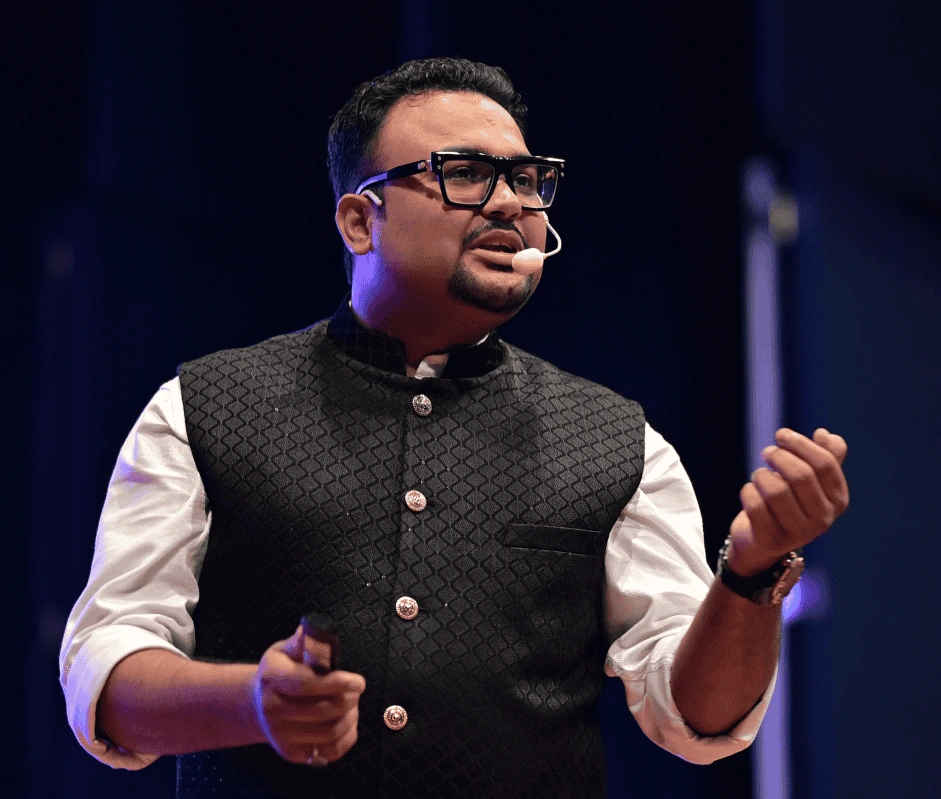
D-Mart vs Vishal Mega Mart Case Study: Retail Business Strategy & Budget Store Comparison
In a country where every rupee counts, shopping is not just about buying, it's about making smart choices. And when it comes to budget-friendly retail giants, two names dominate Indian households: D-Mart and Vishal Mega Mart. Whether you’re a cost-conscious family, a savvy bargain hunter, or even a retail entrepreneur looking for business insights, this comparison isn’t just interesting, it's essential.
But here’s the catch. This isn’t just a price war. It’s a clash of business models, consumer emotions, and shopping experiences. One thrives on simplicity and scale, the other thrives on accessibility and variety. So, who really wins this retail race, the calm strategist or the bold mass player?
Let’s dive deep into this budget battle and uncover the truth behind D-Mart and Vishal Mega Mart, and what their journey means for you.
The Silent Retail War in Indian Homes
Every time an Indian family prepares for their monthly shopping, there is a quiet question in the background: Where will we get more for less? This isn’t just about buying groceries or clothes. It’s about trust, value, and saving money where it counts. And in this conversation, two names keep coming up over and over again, D-Mart and Vishal Mega Mart.
For entrepreneurs, business owners, and even retail lovers, this battle between two of India’s biggest budget retail chains is more than just a shopping debate. It’s a blueprint of how Indian consumers think, how pricing psychology works, and how retail business models can win or lose depending on one simple truth: do you really understand your customer?
The D-Mart Way: Low Cost, High Trust
If you’ve ever walked into a D-Mart, you’ll feel like you’re stepping into a place designed for the smart saver. No loud music. No digital screens. Just racks filled with essential products, from groceries to daily household items to budget clothing. Nothing fancy, but everything functional.
And that’s exactly the point. D-Mart isn’t about flashy looks; it’s built to save you money, plain and simple. It impresses you with value. Founded by Radhakishan Damani, a name that stands for calm confidence in India’s business circles, D-Mart works on a simple yet powerful model: buy in bulk, sell at low margins, and make money through scale.
Most people don’t realise how strategic this is. D-Mart owns most of its stores. So while others pay rent, D-Mart pays itself. This saves crores every year. That money goes back into keeping product prices low. Customers don’t see the business model. They just see cheaper rates. But behind the scenes, it’s a masterclass in cost control and retail supply chain management.
The Vishal Mega Mart Comeback Story
Now, imagine a different scene. In a small town, Vishal Mega Mart bustles with families hunting for everyday deals and essentials. Kids are looking at toys. Parents comparing shirts. Teenagers picking budget sunglasses. It feels a bit more chaotic, more colourful. But there’s energy in the air. Because Vishal Mega Mart is more than just a store in many towns, it’s a mini-mall where everyone can afford something.
Vishal Mega Mart didn’t always have it easy. After facing a financial crisis in 2011, the brand was written off by many. But it made a comeback. Stronger, sharper, and more focused. This time, it aimed at a very specific India – small cities, tier-2 and tier-3 towns, and neighbourhoods where options were limited but aspirations were high.
The idea was simple. Bring style and everyday essentials together in one convenient place. Keep prices low. Expand fast. And don’t try to be elite. Just be everywhere your customer needs you. The model worked. Today, Vishal Mega Mart is quietly present in places where bigger names haven’t even stepped in.
What the Customer Feels: The Emotional Difference
Talk to someone who shops at D-Mart regularly. They’ll tell you it’s efficient. In, out, done. Prices are unbeatable. You go with a list and leave with savings. The satisfaction is calm and deep. You feel smart, not flashy.
Now speak to a loyal Vishal customer. There’s a different kind of excitement. It’s not just about groceries. It’s about finding a shirt you didn’t plan to buy. It’s about walking in for detergent and walking out with a new bedsheet. There’s an element of surprise. A sense of exploration. It feels like a budget version of a mall trip.
Neither is wrong. They’re just different. One promises savings through discipline. The other offers discovery within a budget. For Indian consumers, both matter depending on the day, the mood, and the need.
The Business Behind the Scenes
Here’s where it gets even more interesting for business minds. D-Mart believes in deep control. By owning stores, managing supply chains tightly, and limiting its product categories, it ensures everything is under watch. It lays the groundwork for consistent growth, dependable outcomes, and long-term success in the organized retail industry in India.
Vishal Mega Mart follows a leaner model. It doesn’t own most of its stores. It partners, leases, and expands fast. This means lower upfront costs but higher risk. Yet, it allows rapid growth, especially in untapped areas. Their focus is on quick availability, not deep control.
For entrepreneurs studying Indian retail strategies, this opens up a big question: Do you want tight control and slow, steady scaling like D-Mart? Or fast movement and wide coverage like Vishal? Both are valid paths. But you can’t mix them. You need clarity.
Marketing vs Word of Mouth: Who Wins This Round?
You won’t see too many ads for D-Mart. They believe their prices speak louder than any campaign. And mostly, it works. Word of mouth built their empire. A single D-Mart opening can bring crowds that last for weeks.
Vishal is a bit more promotional. They offer deals, do local advertising, and create buzz. But they still stay true to their low-price promise. It’s just wrapped in a bit more colour.
This difference is also a business insight. If your product is consistent and dependable, like D-Mart, you may not need to shout too much. But if your brand is about excitement and energy, like Vishal, then you might need to keep the buzz alive.
Again, it’s about knowing who you are as a business. And what kind of emotion you want to create in your customer’s heart?
The Real Winner: India’s Middle Class
Let’s step back for a second. In this D-Mart vs Vishal battle, who really benefits? The answer is clear. You and me. The everyday Indian shopper.
Because both brands are trying harder, cutting costs, improving supply chains, and offering better choices, we win. We get lower prices, better quality, and more access. And in the process, these brands are shaping how India shops. They’re not just part of the economy. They’re completely reinventing the game from scratch.
As more people move from small kirana stores to organized retail, as aspirations rise in small towns, and as price sensitivity remains high, brands like D-Mart and Vishal will become even more important. And the entrepreneurs who study them today can build the empires of tomorrow.
The CEO Mindset That Can Change Everything
What D-Mart and Vishal Mega Mart really show us is that mindset matters. One chose control. The other chose speed. One focused on metro cities first. The other ran to small towns. Both understood something deep about Indian consumers. And both bet everything on their strategy.
Because business is not just about product or price. It’s about clarity. And when you learn to think like a CEO, your business stops surviving and starts scaling.
So, Who Really Wins the Budget Battle?
In truth, there is no single winner. D-Mart rules with quiet confidence. Vishal Mega Mart wins with mass energy. Both are champions of India’s retail heartland. Both are showing the world how to win in a price-sensitive market without losing soul or scale.
But the bigger win? That belongs to the Indian consumer who now has choices, and the Indian entrepreneur who now has a model to study, adapt, and follow.
If you’re in business today, let this be your signal. It’s time to go deeper. Think clearer. Build smarter.
Because the future of Indian retail isn’t just in big malls or online apps. It’s in knowing your customer, mastering your model, and leading with vision, just like D-Mart and Vishal Mega Mart did.
Frequently Asked Questions (FAQs)
Q. Why is D-Mart cheaper than other stores?
D-Mart operates on a low-margin, high-volume model and owns most of its stores. This reduces rental costs and allows bulk buying, which helps pass savings to customers.
Q. What is the retail business strategy of Vishal Mega Mart?
Vishal Mega Mart focuses on tier-2 and tier-3 cities with leased store models. They target affordability, mass variety, and quick availability to dominate underserved regions.
Q. Which store is better for budget shopping: D-Mart or Vishal?
Both cater to budget-conscious customers. D-Mart is ideal for planned monthly shopping with consistent pricing, while Vishal offers variety and spontaneous deals in one place.
Q. What can entrepreneurs learn from D-Mart and Vishal Mega Mart?
Entrepreneurs can study D-Mart’s focus on control and scale versus Vishal’s speed and market coverage. Both approaches reflect deep customer understanding and strategy clarity.
Q. Are D-Mart and Vishal Mega Mart good retail case studies?
Absolutely. Both provide rich insights into Indian retail evolution, consumer behavior, and competitive business modeling in price-sensitive markets.
- Market Analysis
- Business case study






